 Top 12 Benefits of a Fasting Lifestyle
Top 12 Benefits of a Fasting Lifestyle
Fasting is a healing strategy that has been used since the beginning of mankind and has been revered by many ancient healers and philosophers throughout history. Unfortunately, the healing art of fasting has been forgotten by mainstream medicine and most people are trained by society to believe fasting is bad for the body. In this article, you will learn the top 12 benefits of a fasting lifestyle and how to apply it into your life.
The research on fasting has been quite remarkable, showing that it has the ability to reduce inflammation and chronic disease development better than any other nutritional strategy. I truly believe that fasting is the most ancient, inexpensive and powerful healing strategy known to mankind. Read this article to find out why I am making such a bold statement.
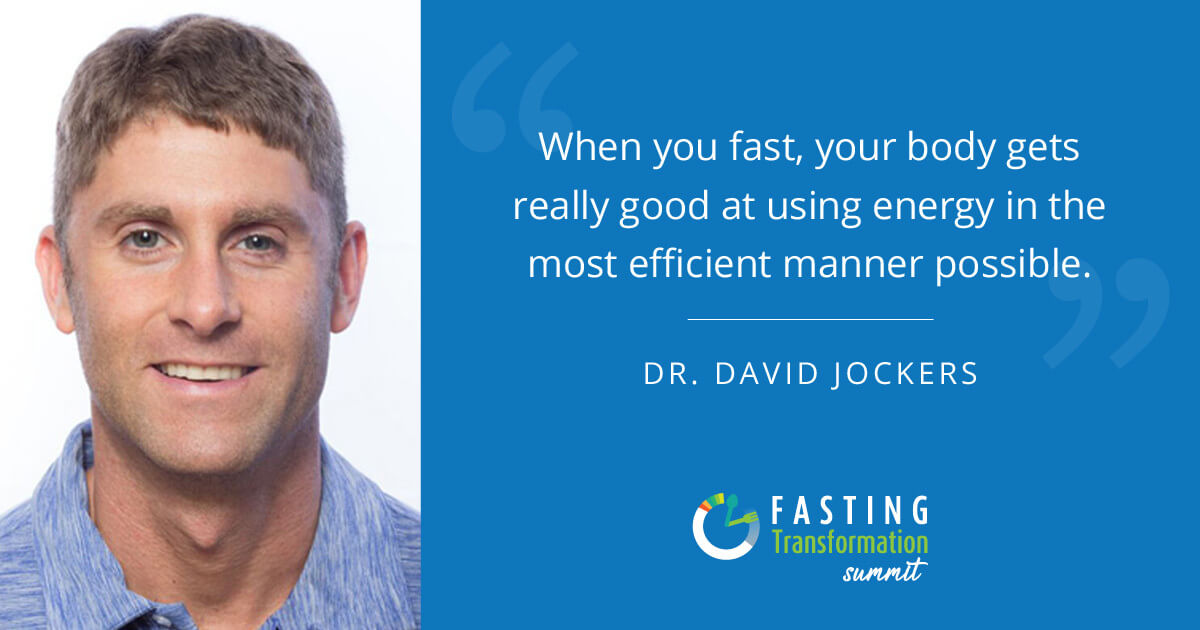
Fasting Myths:
“The illiterate of the 21st century will not be those who cannot read and write, but those who cannot learn, unlearn, and relearn.” – Alvin Toffle
Most people in society were led to believe we need to eat at least 3 meals a day and often snack in order to meet our energy requirements. We thought something really bad, like our metabolism would slow down and we would get fat or on the flip side, we would get super skinny or wither away if we ever missed a meal.
Being thin my whole life, I was always scared that I would lose my hard-earned muscle mass if I ever missed a meal or even felt hungry. When I began fasting, after a week of transitioning, I noticed the opposite in that I felt stronger and more resilient to stress.
As I have advocated a fasting lifestyle over the years, I have found a number of very common myths associated with fasting that I cover in this article here. If you have specific questions about these ideas, please read this article here.
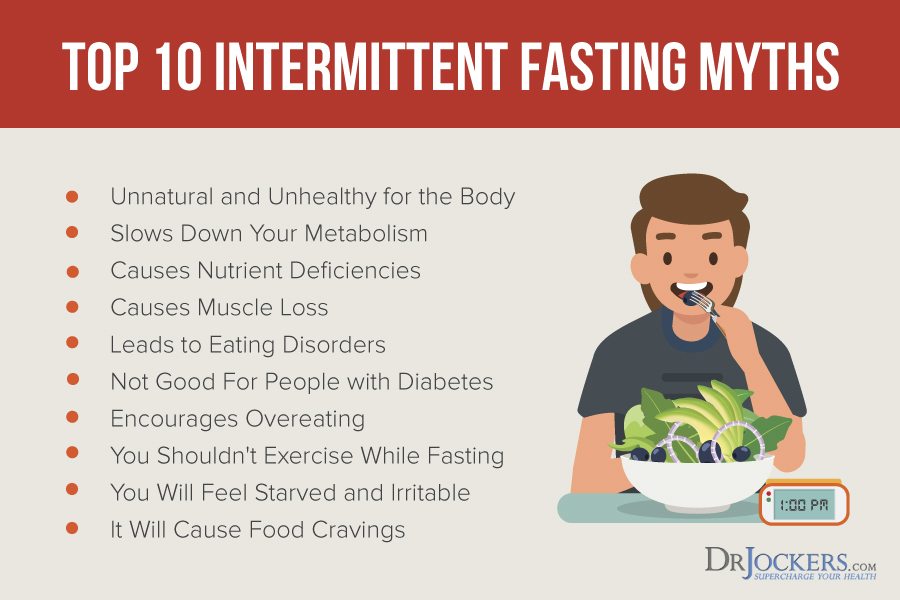
Who Shouldn’t Fast:
The purpose of the current article you are reading is to review the science and show you 12 powerful reasons to begin a fasting lifestyle. However, there are certain cases, where I do not advocate fasting. These cases include
Individuals with Eating Disorders
Pregnant Women and Newborns
Young Children
Individuals with Type I Diabetes
Extreme Athletes Who are in Season
Individuals Who Are Severely Underweight
Individuals Who Are on Medications (Especially diabetes medication, anti-seizure meds and corticosteroids as these can impact blood sugar levels)
In some of these cases, fasting can be extremely helpful but it needs to be done with caution and a trained healthcare practitioner. An example of this would be an overweight pregnant woman who is at risk for preeclampsia.
Intermittent fasting in this case could help her to improve her blood sugar, blood pressure and make her internal environment safer for the baby. But again, this needs to be done with a trained healthcare practitioner.
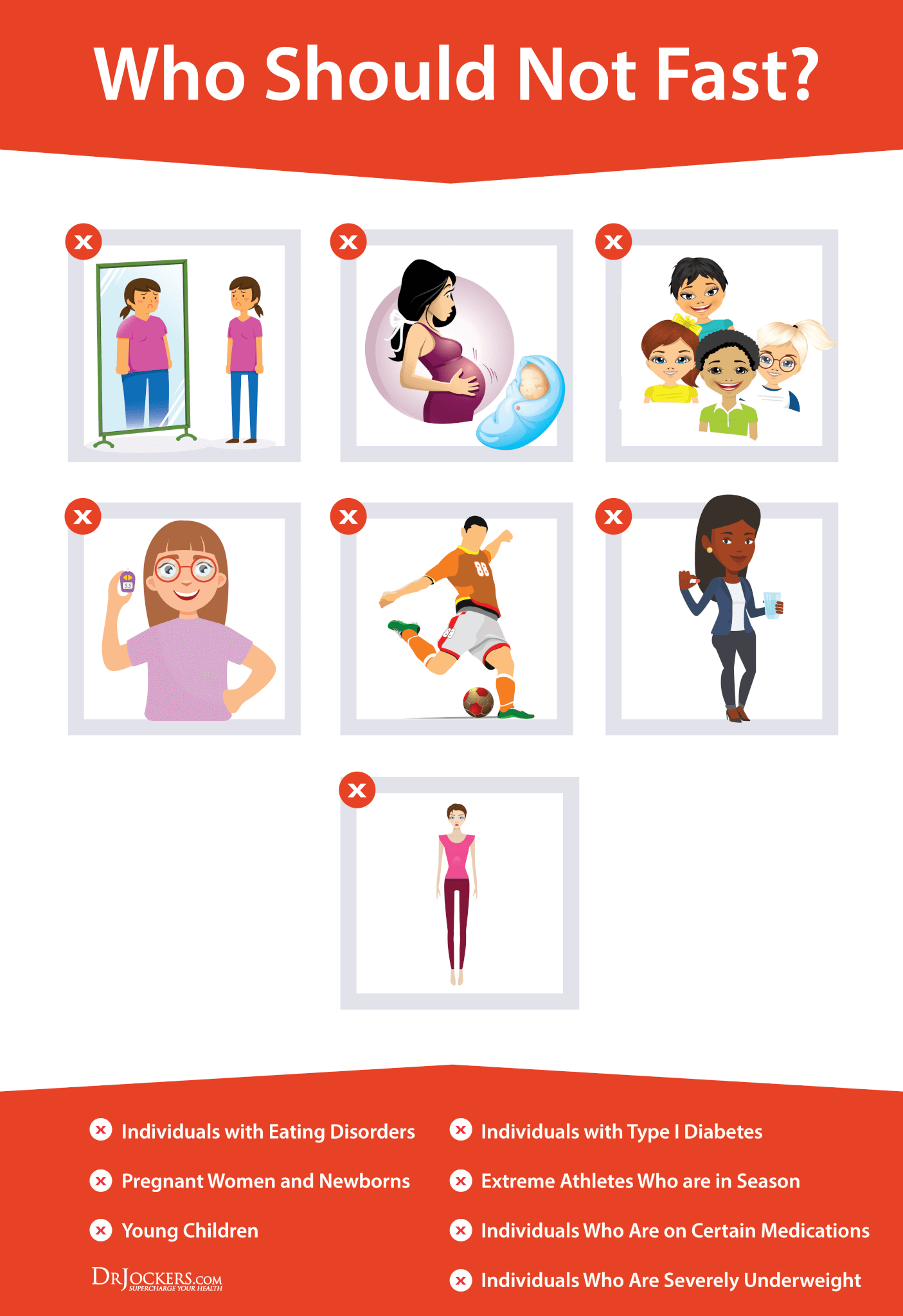
Metabolic Flexibility and Energy Efficiency
As we begin to understand how a fasting lifestyle benefits our body, we need to understand some basic terminology. The key terms are metabolic flexibility and energy efficiency.
Metabolic Flexibility: The ability to change our metabolism to meet the demands of our environment.
Energy Efficiency: Using our energy in the most efficient matter possible to regulate all the needs of the body.
As humans, we have had to adapt to a number of different challenging environments. We have had to run, climb, fight, lift, starve and kill in order to survive. Our ancestors did not always have access to food and would regularly have times of food shortage and famine. These challenges primed our physiology and gave us a stronger survival advantage through an ability to change our metabolism to meet the unique demands we face.
In 21st century society, we don’t have to do many of these things. We can basically sit back and stay stationary all day while continuously feeding ourselves. This causes a loss of metabolic flexibility and energy efficiency.
Our societal habits have cost us metabolic flexibility & energy efficiency, which make us weaker as a species and more susceptible to the development of chronic disease.
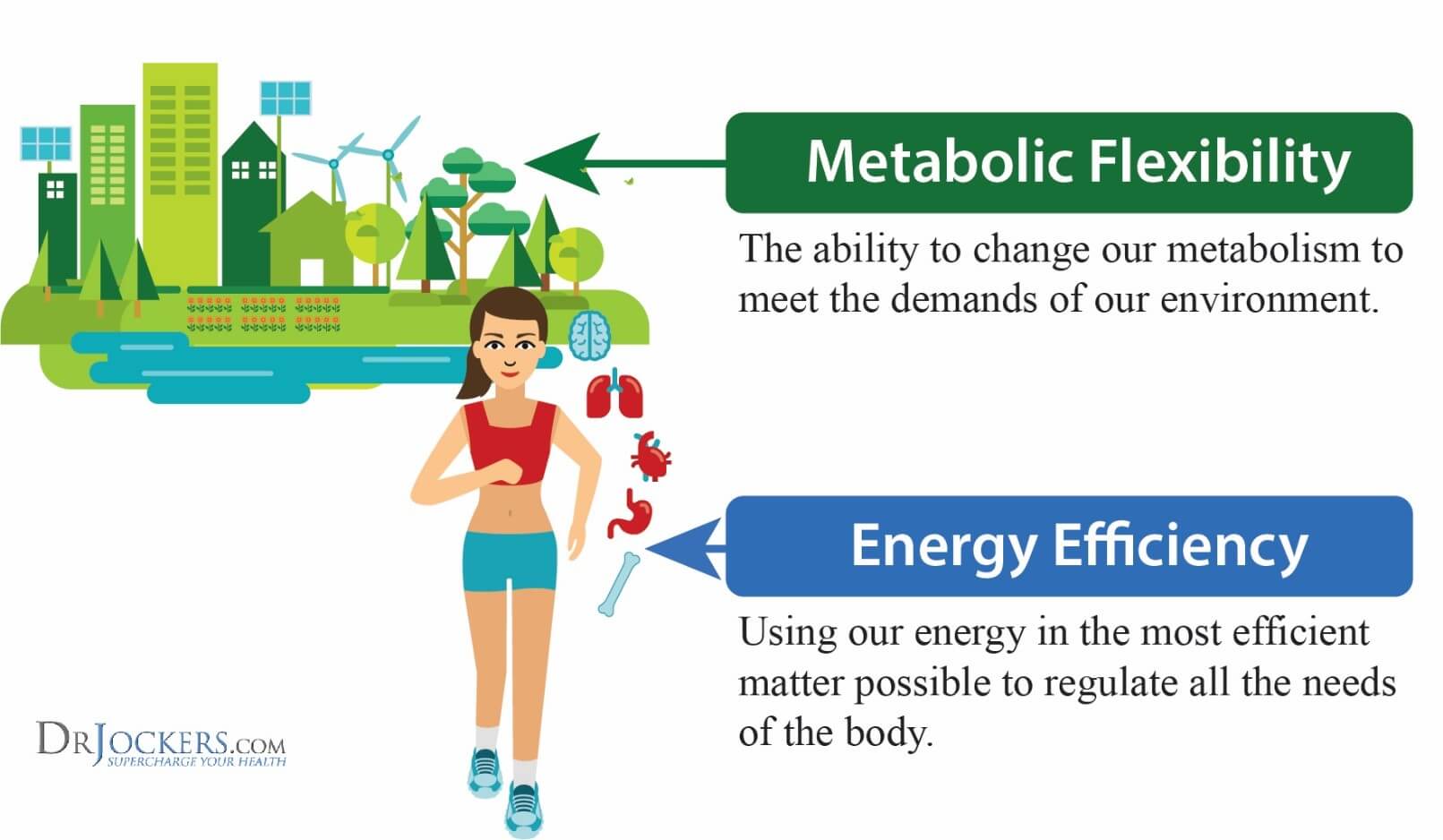
Top 12 Benefits of Fasting
There are a number of benefits to fasting and reasons to apply it into your life. You may not experience all of these benefits the first time you fast. Fasting is like exercise, there is an adaptation that must take place before you really feel good.
I call this process, building your fasting muscle, because overtime you get stronger and more resilient to periods without food. Typically, this will be 1-2 weeks of intermittent fasting before your body resets and your hunger hormones reduce and you adapt to your new eating schedule.
If you are trying out an extended fast beyond a day, the first time is usually the hardest and it typically gets easier with each successive fast unless you are under a lot stress.
This article discusses the use of a fasting lifestyle because you won’t get nearly the benefits if you do a fast once or twice a year. Practicing intermittent fasting on a regular basis with an occasional extended fast is where the real gold is at and that is what we call the fasting lifestyle.
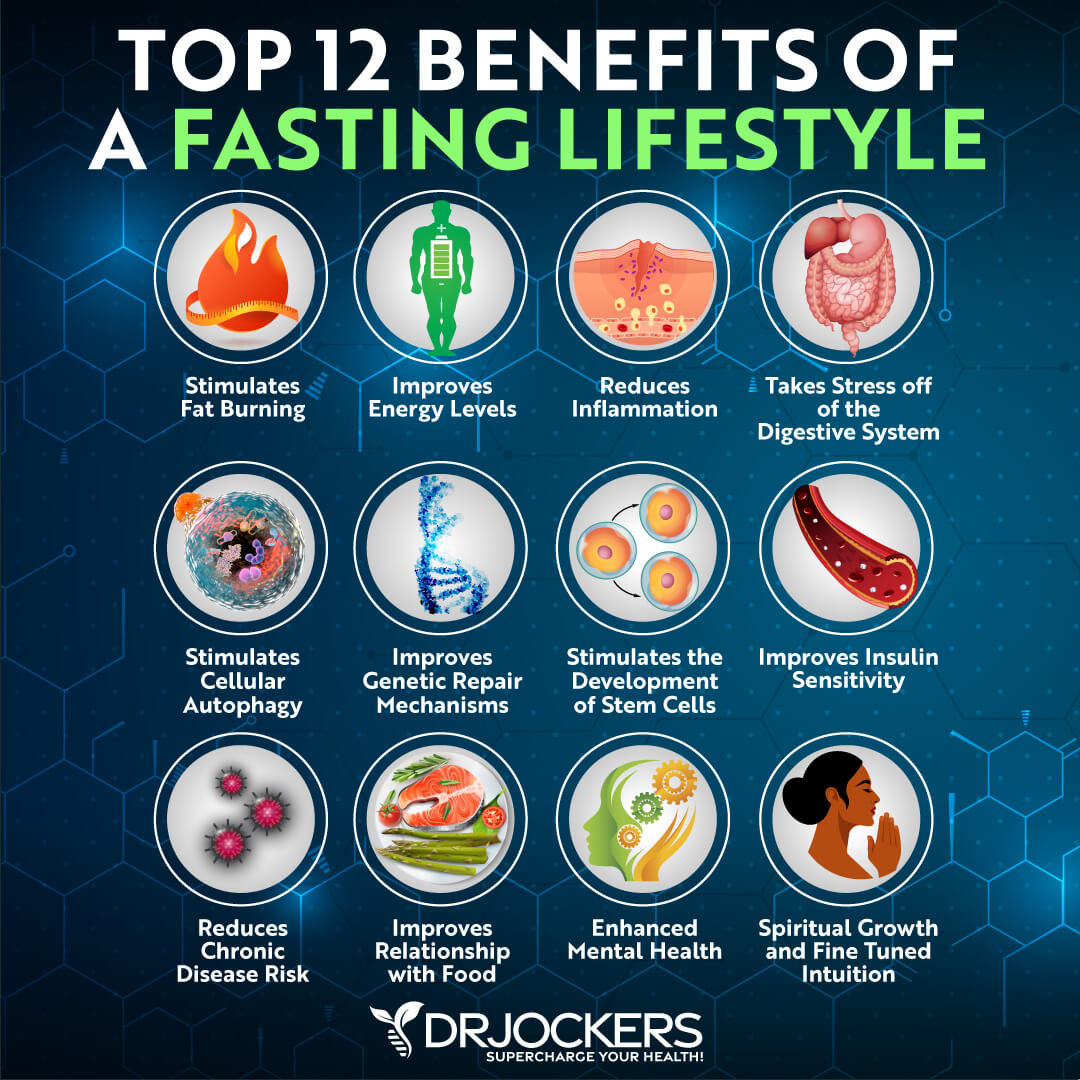
Stimulates Fat Burning:
When you fast, your body needs to find an alternative fuel and it will first begin by burning up stored sugar called glycogen. As our glycogen stores go down, our body will begin burning fat for fuel and producing ketones.
This process improves your body’s ability to burn fat on a regular basis and we call that fat adapted. As a fat adapted individual, your body will have the metabolic flexibility to easily shift from burning sugar when you consume carbohydrates in your meals to burning fat when you are outside of meals.
Many people mistakenly believe that fasting will slow down your body’s metabolism but the research shows that this is untrue. It is long-term calorie restriction, where you are still eating but fewer calories than your body needs for a long period of time that reduces your metabolic rate (1, 2).
Fasting actually stimulates fat burning hormones such as human growth hormone (HGH) and norepinephrine that keep your metabolic rate optimized. The research shows that this fat burning hormone release helps individuals who need to lose weight to do so very effectively with intermittent and extended fasting (3, 4). If you want to burn fat for fuel than a fasting lifestyle is the ideal way to go!
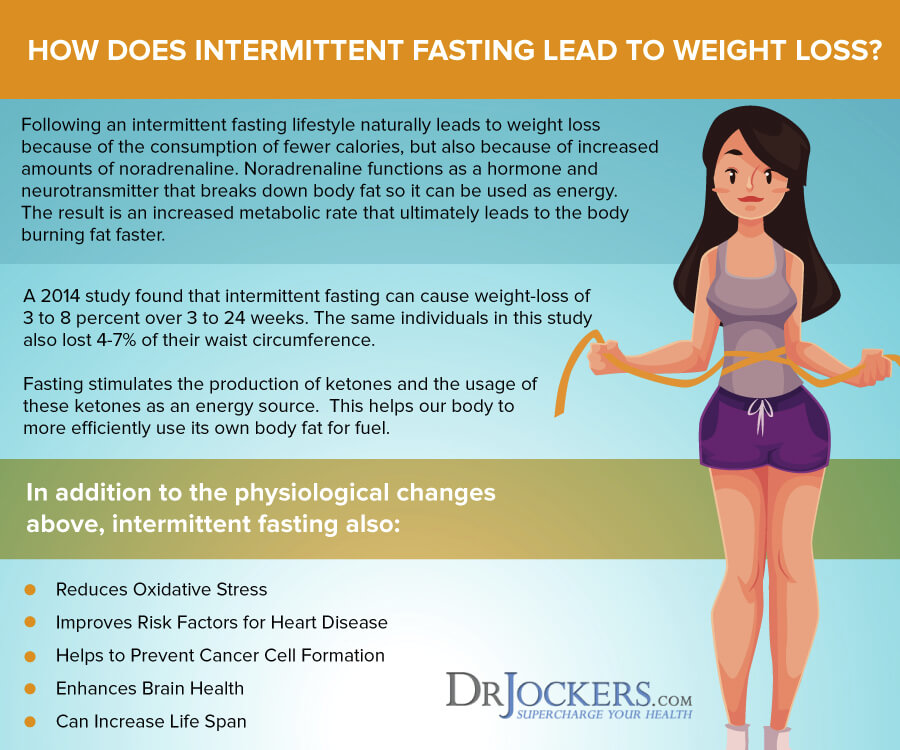
Reduces Inflammation:
Fasting has been shown in numerous studies to reduce the activity of inflammatory inducing gene pathways in the body and the number of inflammatory cytokines produced in the body.
An interesting study showed that intermittent fasting for 16 hours each day for 4 months created a marked reduction in the neuro inflammasomes which are genetic receptors that amplify inflammation throughout the brain. This study was done on individuals who had suffered an Ischemic stroke so they had very high levels of brain inflammation (5).
By reducing brain inflammation, we significantly reduce our risk of stroke and neurodegenerative conditions like Parkinson’s, dementia and Alzheimer’s. In addition, when we reduce brain inflammation, we feel lighter and are able to think sharper and quicker. This enhances mental acuity and helps us feel energized.
These benefits are one of the major reasons why people who practice a fasting lifestyle become so passionate about it. You can really feel this working in your body and your mind!
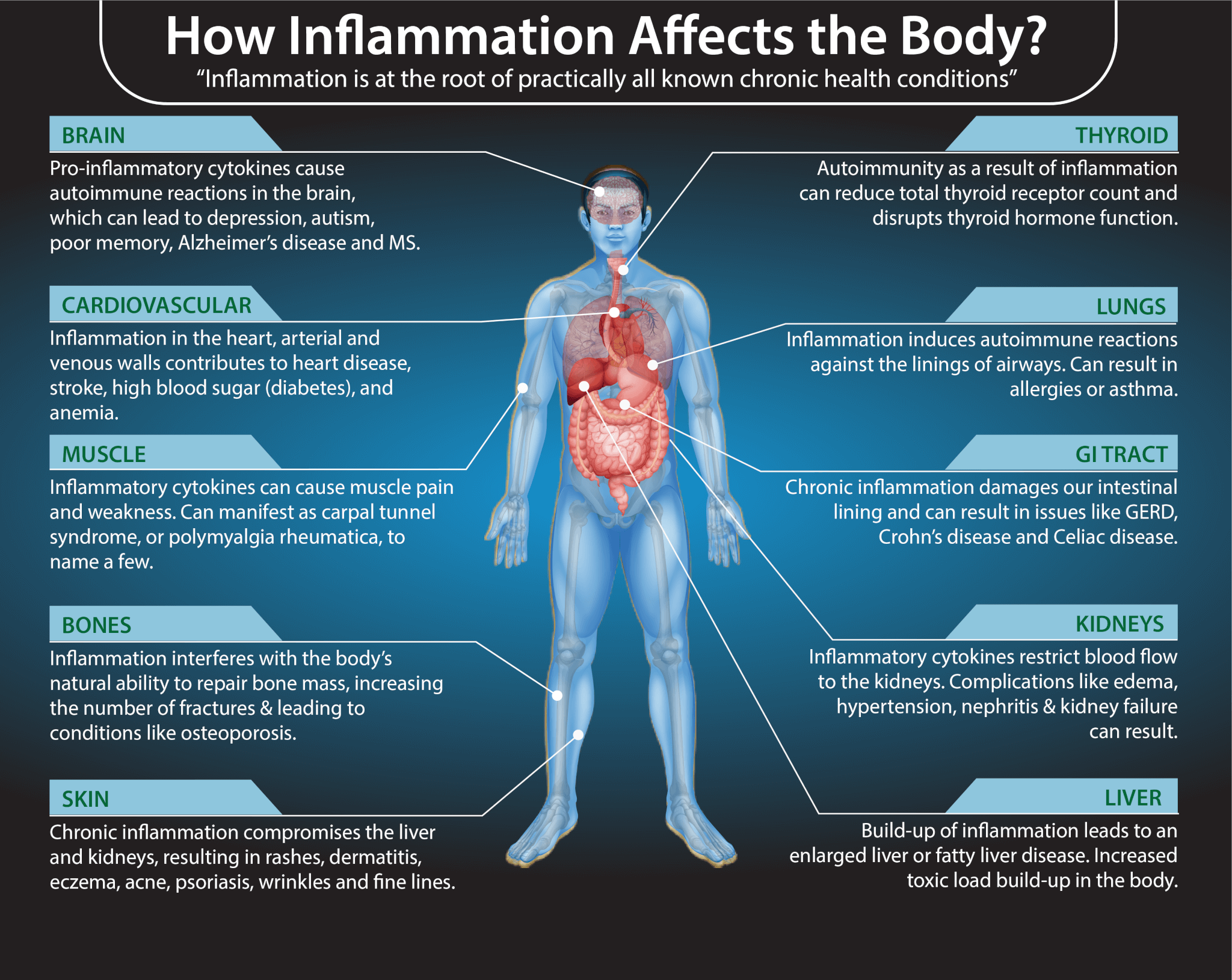
Improved Energy Levels:
There are 3 main reasons why we experience an increase in energy when we get fat adapted and are running on ketones as you follow a fasting lifestyle. These reasons are the following
- Ketones are Clean, Energy Efficient Fuel
- Fasting and Ketosis Increase Mitophagy
- Fasting and Ketosis Increase Mitochondrial Biogenesis
Once we get keto adapted on a fast, we produce more energy and less oxidative stress. This is a really clean, high performance fuel. Imagine you had a high-performance vehicle like a sports car, that not only had the performance but also got 80 miles per gallon of gas and had very low carbon emissions. This is what using ketones to produce cellular energy does for our body!
The mitochondria are what produce energy within every cell of the body. The more well-functioning mitochondria we have within each cell, the more cellular energy we can produce. Chronic disease states are associated with an abundance of old and dysfunctional mitochondria.
Fasting and ketosis stimulate something called mitophagy, where our body breaks down these older, more dysfunctional mitochondria and uses the materials to produce new mitochondria (6). We also increase the number of mitochondria within each cell. (7).
By increasing the amount of healthy and well-functioning mitochondria in each cell, we produce a tremendous amount of cellular energy. This is all due to improved metabolic flexibility and energy efficiency.
Additionally, fasting also increases norepinephrine levels just slightly which increases mental clarity and overall energy. The combination of elevated ketones and norepinephrine can create a sort of “fasting high,” where people experience a form of unlimited energy and euphoria.
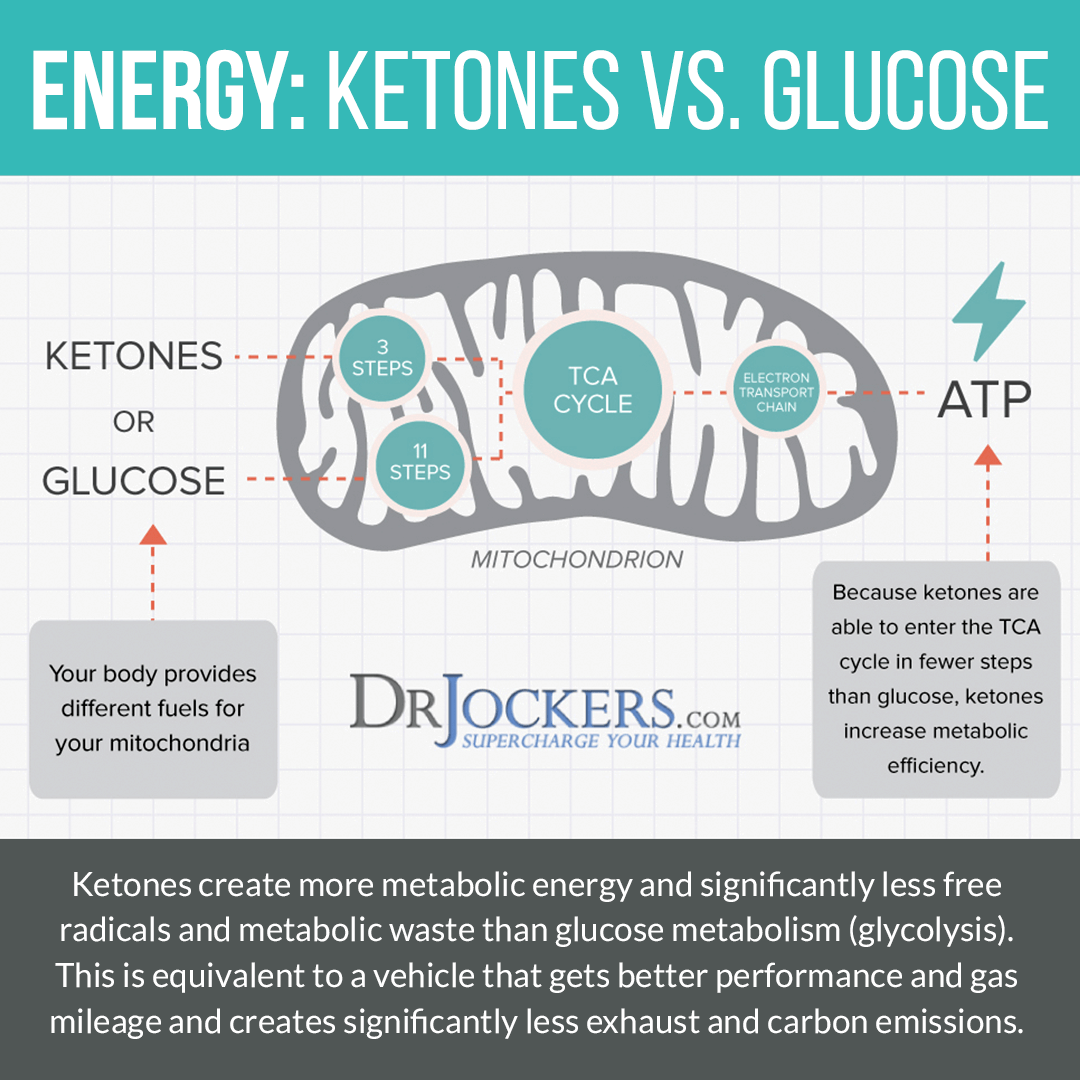
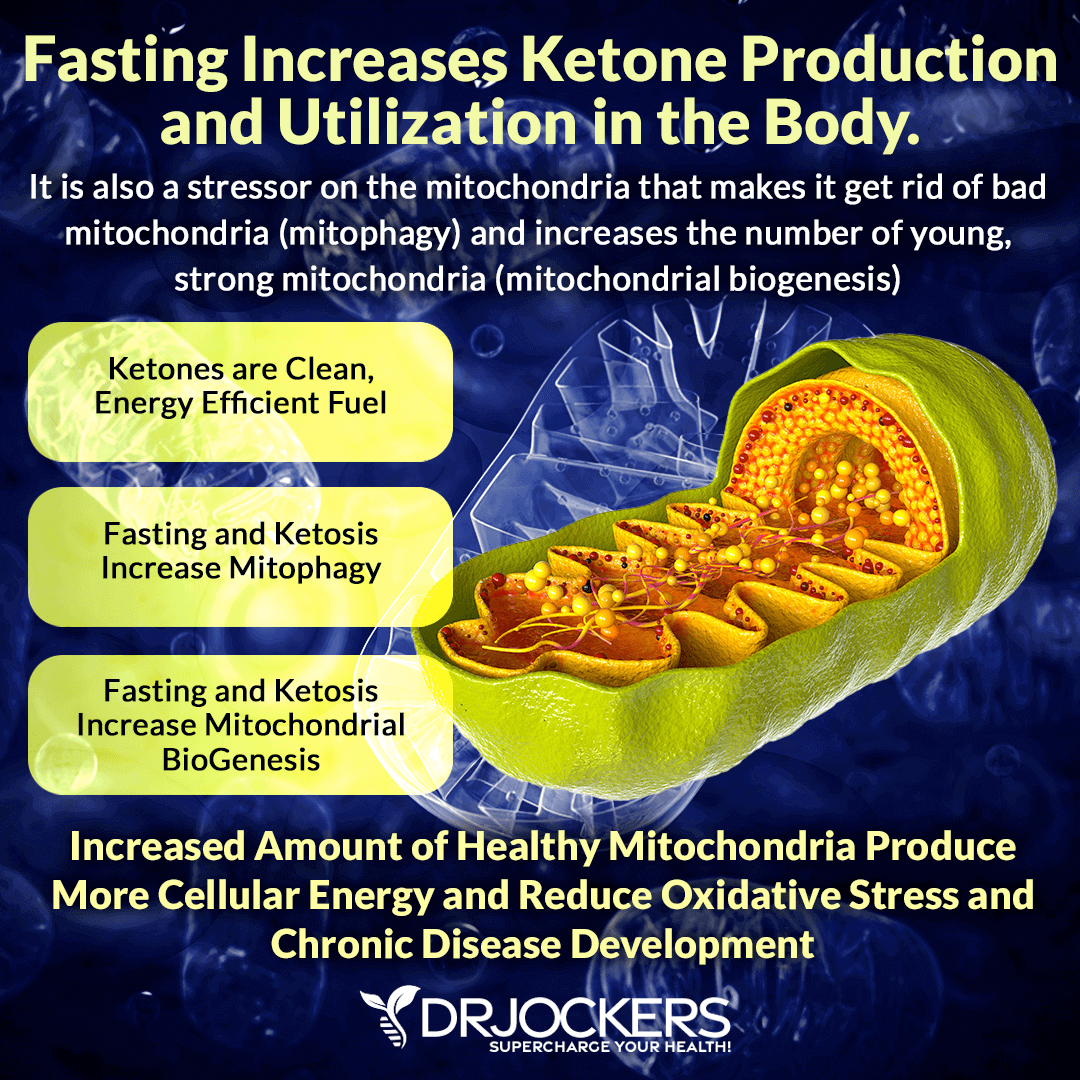
Takes Stress Off of the Digestive System:
Digestion is a very stressful and energy demanding process that our body must undergo whenever we eat. When we fast, we are able to divert the energy that would normally go into digesting our meal towards healing and repairing the immune system, our joint tissue, brain cells and other regions of the body.
Additionally, by fasting, we take mechanical stress off of the gut and allow it to heal and repair itself. Using fasting and liquid nutrition are key strategies to help heal intestinal permeability, otherwise called leaky gut syndrome. One 2018 study, showed that fasting for 24 hours enhanced intestinal stem cell production (8).
Imagine you had a sprained ankle and you had to walk and run on it all day. The ankle would be a constant source of pain and limitation and it would never heal. In order to heal a sprained ankle, you have to stay off of it and allow it time to break down the damaged joint tissue and rebuild new joint tissue.
In the same way, our gut needs time away from mechanical stress that food creates when it is passing through. This is a powerful reason why I am such a huge fan of a fasting lifestyle and liquid nutrition. For many people, such as myself, I do better with less solid food meals.
Most days I have one big keto smoothie (liquid nutrition) and a solid food meal. Sometimes, I only have the smoothie and fast the rest of the day. This helps me to heal and strengthen my gut lining.
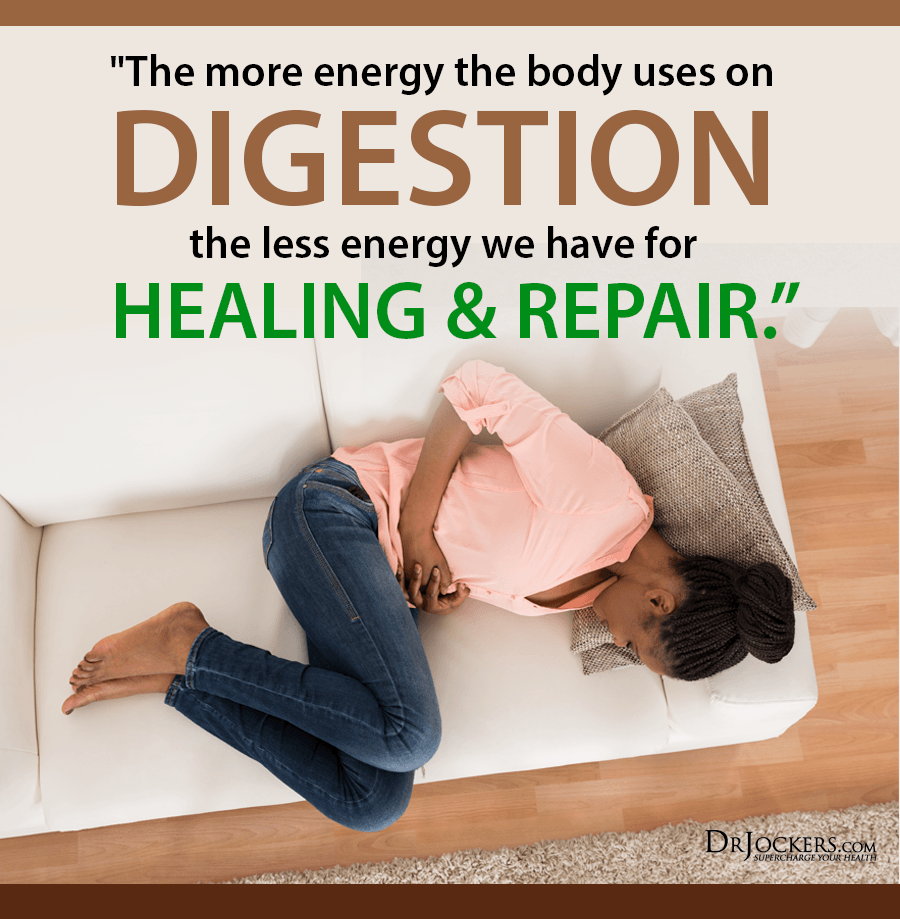
Stimulates Cellular Autophagy:
The word “autophagy” originates from the Greek words “auto,” which means self, and “phagein,” which means to eat. Thus, autophagy is a process of self-eating. This emerged in the 1960’s when researchers observed that a cell could destroy and recycle its own parts. In 2016, a Nobel prize was awarded to Yoshinori Ohsumi, for his work in identifying key genetic pathways essential for autophagy.
Autophagy is part of the innate immune system, where the body breaks down old, damaged cellular components and abnormally developing cells to recycle for energy. This is true cellular cleansing, where we cleanse the cell of older, inferior machinery to make room for newer, more well-functioning organelles.
One key element of autophagy is called mitophagy, where the body metabolizes old, damaged mitochondria to use the materials and space in the cell to develop new, healthier and more stress resilient mitochondria (9).
The better functioning cellular components and mitochondria our body contains, the better we will function. This means higher performance and more resilient to stress, aging and the development of chronic disease. Practicing a fasting lifestyle is the number one way to induce the appropriate amount of autophagy in our body.
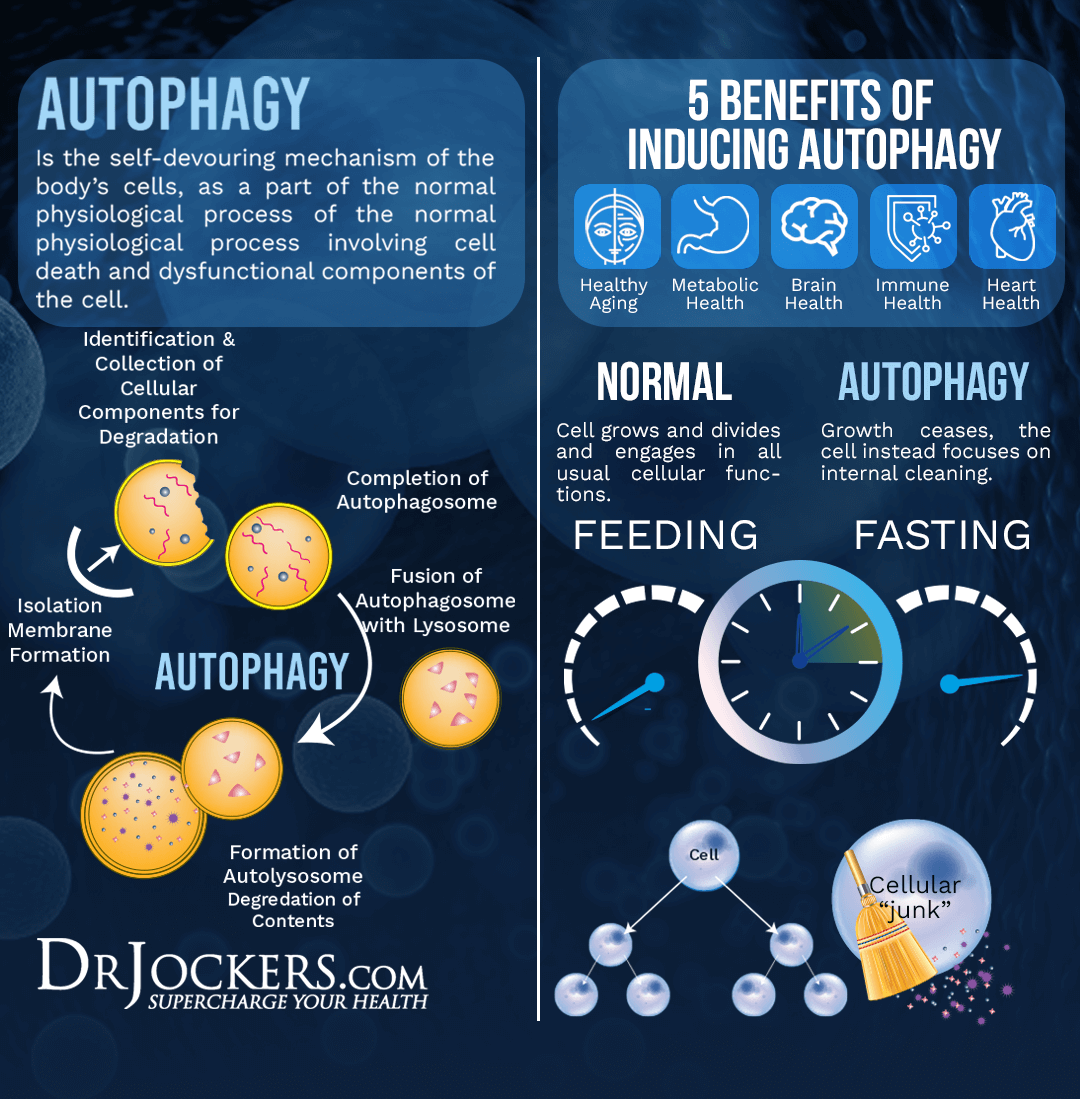
Improves Genetic Repair Mechanisms:
Research has shown that cells have a greater lifespan during times of food scarcity and famine. Fasting enhances cellular rejuvenation by acting on certain genetic repair mechanisms. We use less energy to repair a cell than to divide and create new cells.
The main hormone responsible for this improved repair mechanism is human growth hormone (HGH), which goes up significantly as the length of the fast increases. In fact, a study done at the Intermountain Medical Center found that men who fasted for 24 hours had a 2000% increase in HGH from baseline and women had a 1300% increase from baseline after fasting for 24 hours (10).
HGH helps improve cellular healing and stimulates fat burning, lean muscle and bone development and helps to modulate the immune system in such a way that it reduces inflammation. HGH has also been found to improve the quality of collagen tissue in our joints, skin and nails.
Many believe HGH to be a sort of anti-aging serum within our bodies. By applying the principles of a fasting lifestyle, we can get a great boost of HGH on a regular basis to improve our physical appearance and bodily structure and slow down the aging process.
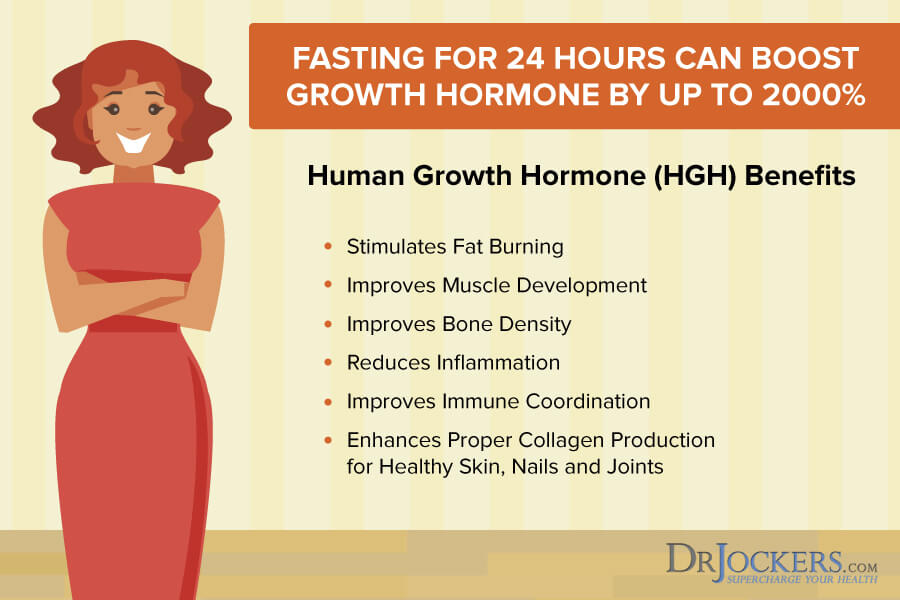
Stimulation of Stem Cells:
Fasting has been shown to increase stem cell activity, giving our body very youthful cells that can provide a wide variety of benefits. Many people inject stem cells to help repair damaged joints. Fasting is a way to internally stimulate these stem cells to repair damaged areas of our body.
Studies have shown that prolonged fasting (PF) lasting 48–120 hours reduces pro-growth signaling (Insulin like growth factor -1 or IGF-1 and Protein Kinase A or PKA) and activates pathways that enhance cellular resistance to toxins and stress in mice and humans (11).
In particular, fasting was shown in several studies to block the immunosuppression side effects of chemotherapy through the increase in hematopoietic stem cells (12). Shorter, intermittent fasting won’t increase stem cell production in the same way for most of the body.
However, certain regions of the body, such as the intestinal lining have been shown to increase stem cell development in as little as a 24 hour fast (8). This makes sense as the cells of the intestinal lining have short life spans and turn over every 3-5 days.
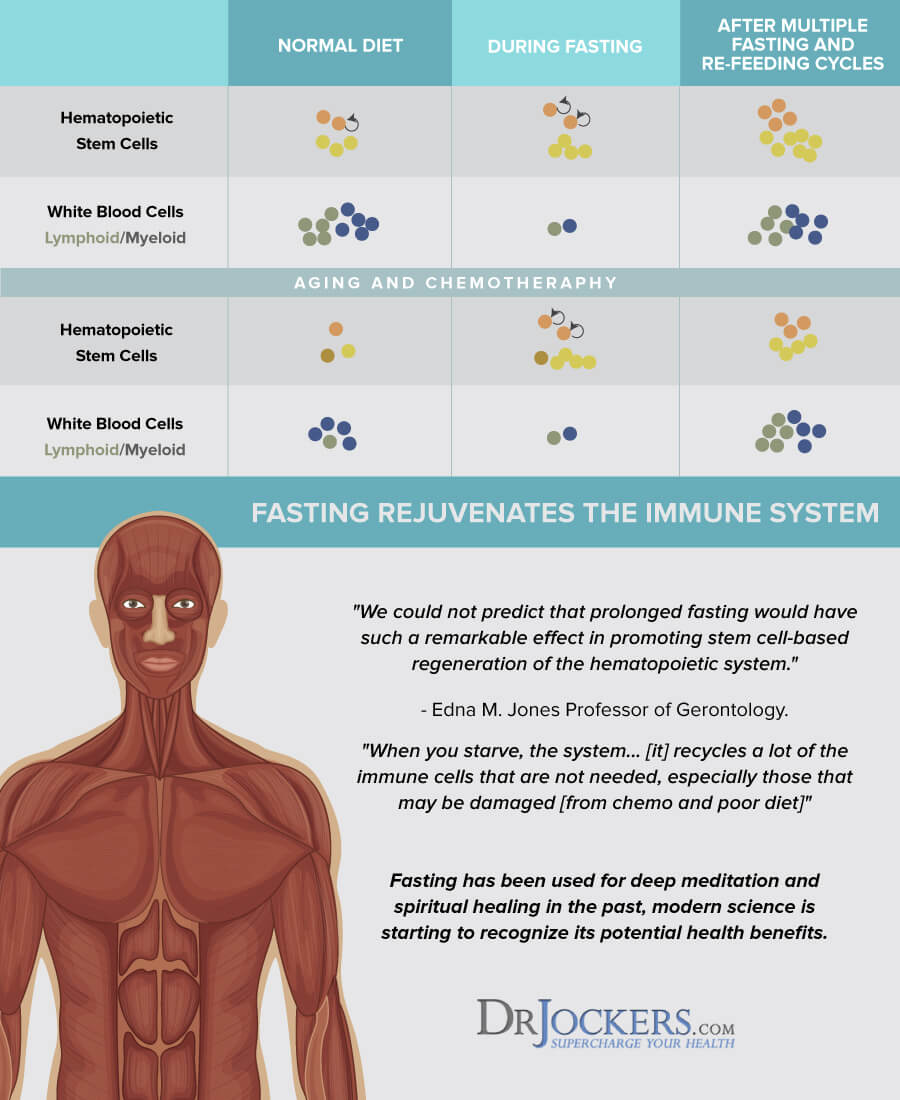
Improves Insulin Sensitivity:
Insulin is a hormone that is responsible for putting sugar into cells and stimulating glycolysis and lipogenesis. These terms mean burning sugar for fuel and increasing fat storage.
In addition, high insulin levels from frequent feeding and high carbohydrate foods, stimulate inflammatory gene pathways. Fasting improves the use of insulin, so we need less of it when we consume food and therefore, we have less fat storage and inflammation (13).
Having good insulin sensitivity is also important to deliver nutrients where they need to go. For example, insulin helps get magnesium into the cells of the body where it is a part of over 300 functions. If you have poor insulin sensitivity, you will need to super saturate your system with magnesium in order to get the right amount to the cells.
When you have improved insulin sensitivity, you need less vital nutrients because you have better nutrient delivery systems into the cells. This is one reason why your actual nutrient needs reduce when you are fasting which is a component of the improved energy efficiency you get on a fasting lifestyle.
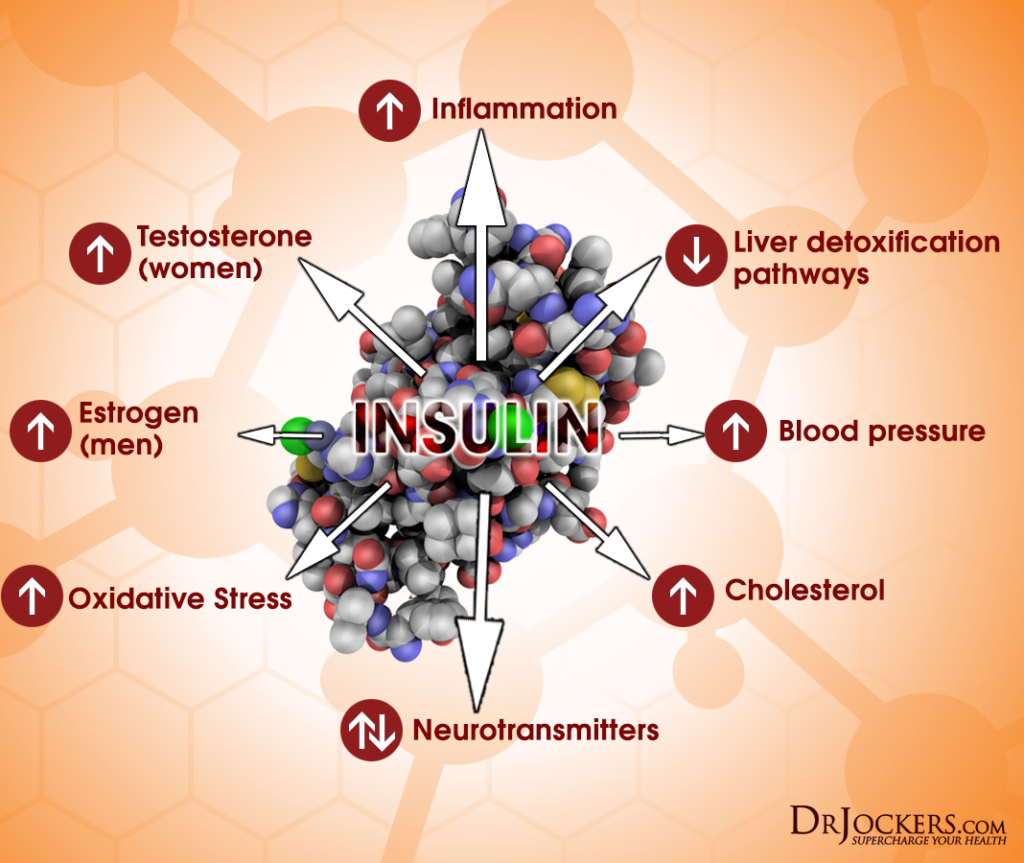
Reduces Chronic Disease Risk:
All chronic diseases are diseases that are characterized by chronic inflammation. Fasting is the most powerful nutritional strategy to reduce inflammation in the body.
When we reduce inflammatory levels, we influence our genes to express better health for all the systems, tissues and cells of the body. In so doing, we greatly reduce our risk of chronic disease and improve the condition of someone who is already dealing with a chronic disease.
Review studies are coming out that analyze the role of intermittent fasting on chronic disease prevention and the reports are promising (14). Hopefully, as the studies continue to go on, the American Medical Association will begin to promote the use of intermittent and extended fasting to reduce chronic disease risk.
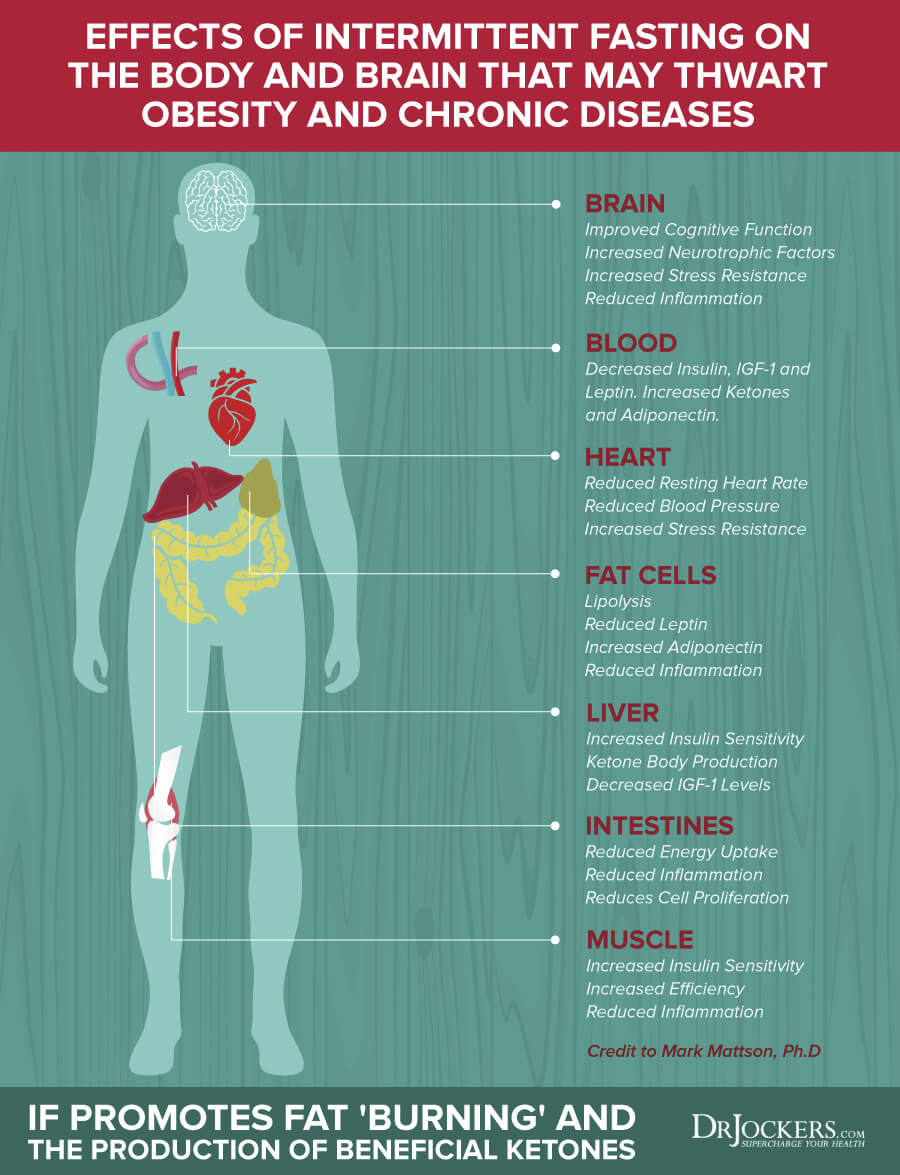
Improved Relationship with Food:
Most of us have caught ourselves eating mindlessly and have struggled with sugar, carb, dairy and other cravings. Fasting helps us to realize that these cravings are mental and emotional and can be overcome.
A big struggle many people have with fasting, is they feel deprived. This is actually a sign that we have been using food as a mood drug of sort that boosts up our feel-good neurotransmitters in our brain. This is really all a mental and emotional addiction and fasting helps us to reset our neurochemistry.
Fasting also helps us to be more grateful and present with the food we do consume. Most people notice that they practice more mindfulness when they eat after an extended fast or while participating in a fasting lifestyle for a period of time.

Improved Mental Health:
As ketones elevate in the body, most people experience improved mood, mental clarity and creativity. Many people observe that they feel the most productive at the peak of their intermittent fast or after 3-4 days of extended fasting.
A 2013 review published in Psychiatry Research showed that therapeutic fasting over a 7-day period showed improvement in mood, alertness and a sense of tranquility in patients with clinical depression (15).
I find that I am the most mentally clear and do my best work when I am in a fasted state with elevated ketones. Additionally, I feel more stress resilient and at peace in this state as opposed to when I am in a fed state.
The philosopher Plato has a famous quote where he says “I fast for greater mental and physical efficiency,” as he knew that his greatest performance both physically and mentally were done in a fasted state. This is why he and many other ancient Greek philosophers and some of the greatest minds throughout the world endorsed a fasting lifestyle.

Improved Spiritual Health and Intuition:
Fasting has also been used throughout history as a way to elevate consciousness and experience a deeper relationship with our creator. Every major religion endorses fasting and they have periods of time where members are encouraged or even required to fast.
When we practice fasting for spiritual purposes, we notice that it helps us to tune out emotional urges and tune into our intuition which helps us make better decisions in life. This is of great benefit whether you practice a particular faith or not.
For Christians like myself, we will use the term Holy Spirit to describe this inner voice of truth that guides us in our life. Many people, including myself, find that fasting helps us hear from the Holy Spirit and have clearer communication with God. In my opinion, this benefit alone is enough to practice a fasting lifestyle.
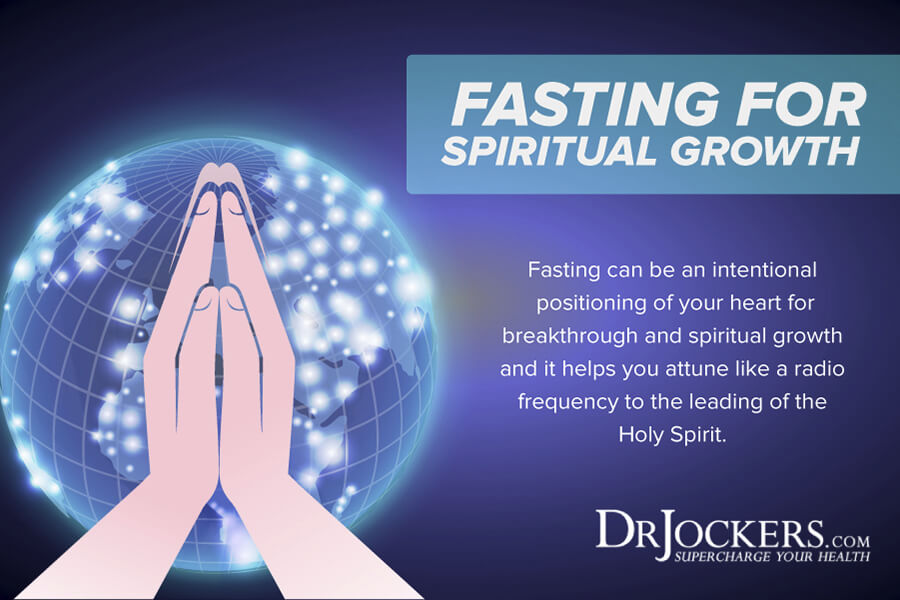
Conclusion:
Thousands of years of human history and modern science have shown that a fasting lifestyle is one of the most ancient and powerful healing strategies known to mankind. Even better, it costs nothing and can be practiced immediately in the comfort of your own home.
Because fasting does not make any industry more money, don’t expect to hear about the scientific breakthroughs that are happening to show up on the news. However, you can begin practicing fasting today.
If you want help finding a good fasting lifestyle strategy to practice than check out this article here or read my book The Fasting Transformation here.
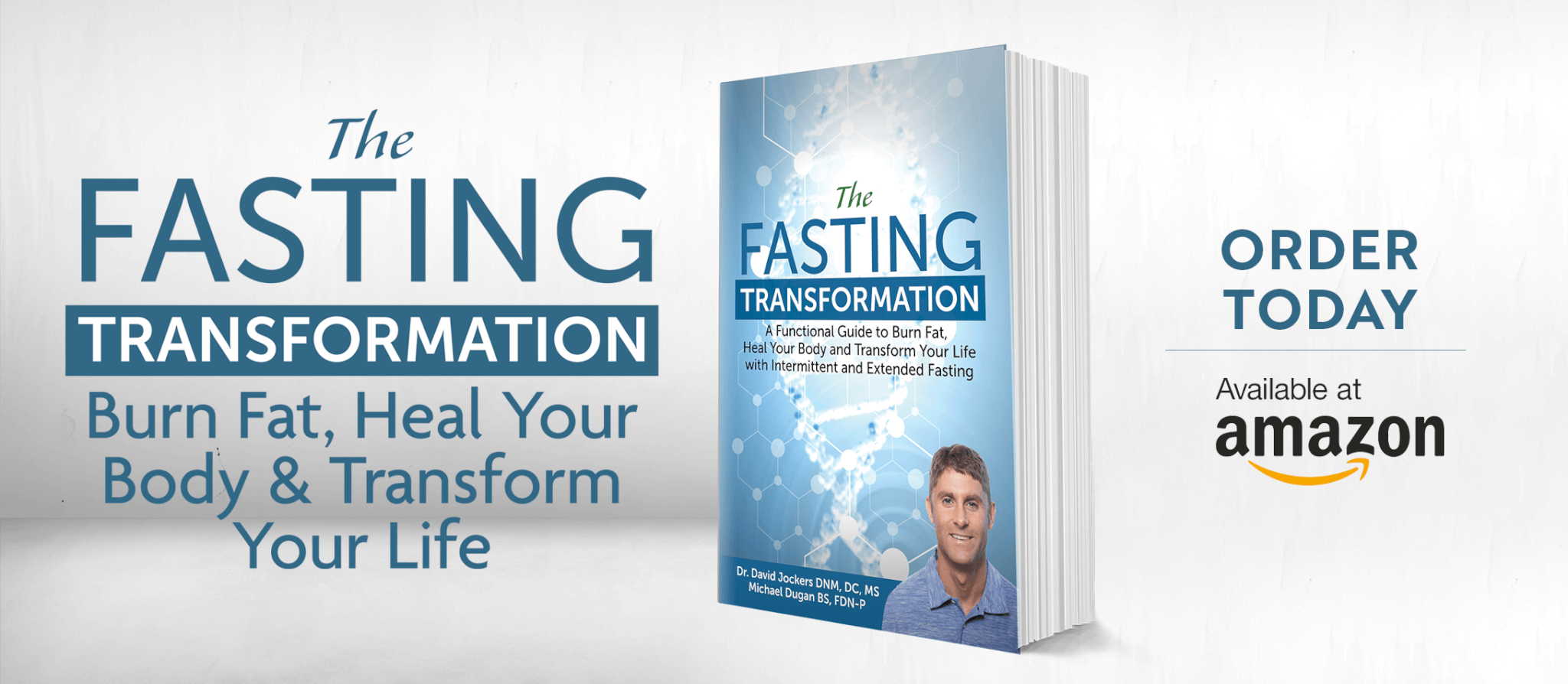



Very very buteful research… that just like we do in islam and for years i did not understand the reason …. Thank you brother
Hey Abdulrahman, Thank you for sharing! Blessings!
hi Mr Jockers i suffer from underactive thyroide atm on 200 m of levelthyroxine, i am reaching also close to diabetic level in my blood test, cholesterol as well over normal level , endometrium , very painfull stomach centre just below ribs a specially last week or more perhaps connection with flu which i ve been going through , pain is like a wonderer if stomach stops ache btw during pain is somethimes like a golf ball, then goes pain to liver above the liver under ribs and gets to spine can last foe many hours usually it happens when i eat even bit of vegies or light juice from boiled apple . i didnt do recently any blood test just for thyroid about 2 weeks ago . and lower abdumen for to check uterus overis etc. what would you advise in y case pls i know u r in usa i am in uk but maybe you got different aproach to health problems.
Sorry to hear this! I would encourage you to work with a functional health practitioner to get to the root cause: https://drjockers.com/functional-nutrition-tips-to-find-a-great-health-coach/
How can I stop the toxic headache associated with fasting?
I go over some helpful strategies in this article: https://drjockers.com/fasting-mistakes/
I’m currently doing keto , 21/2 years , if and omed , I have started 24 hour fasting , planning on weekends .
Can I do too much fasting , how do I know if I’m doing it too much ?
Hey Larry, if you are feeling good with this fasting schedule, then no worries at all! But if you notice too much weight loss, or an increase in fatigue, lowered libido, trouble sleeping, brain fog, anxiety, etc. then it may be an indication of too much fasting.
Thank you Dr. Jockers! I am thankful for your advice. Dec 2019 labs 5.6 A1C and triglycerides 173 Vit D 30
Sept 1 2020 A1C 5.2 triglycerides 51 and fasting insulin 5.8 plus Vit D 54
Sharing this because these are real results and I feel so much better! I am not asking for free medical advise- just thanks to you for such wonderful articles and encouragement.
Great to see your labs are improving Pamela! Blessings to you!
Thanks Dr Jockers for the inspirational articles. I have a problem with fasting. Whenever l fast for 12 hours l overeat when l break the fast and consistency is a problem
Hello Agnes, the key is to make sure you eating a lot of protein – 30-40 grams at a meal which will help with creating satiety.
Thank you for the article. Dr. Jockers, I’m just wondering how fasting affects gallstones. if it can get stuck after i finish my fast and start eating again. I have a 10 mm stone in my gallbladder.